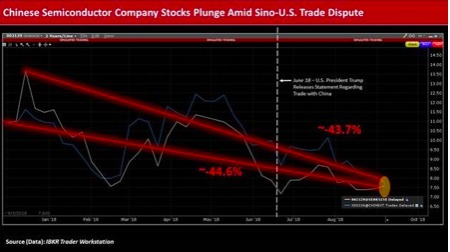Steven Levine
Senior Market Analyst
Interactive Brokers
Beijing-based semiconductor company Tsinghua Unigroup has witnessed a recent freefall in the price of some of its U.S. dollar-denominated bonds.
In my view, several factors appear to have coalesced to conspire against the Chinese chip-maker’s notes, including a more challenging financing landscape due to the rise of the U.S. dollar, as well as amid a looming deadline for additional U.S.-imposed tariffs on China’s imported goods.
Also, I also think that recent reports that Tsinghua Holdings agreed to transfer a hefty stake in Tsinghua Unigroup did not help matters.

Skyrocketing yields
The yield on Tsinghua Unigroup’s 4.75% notes due January 2021 have skyrocketed to roughly 8.7% from a low in February of about 4.7%, and the company’s 5.375% bonds maturing January 2023 have soared to a little more than 9.6% — a rise of 3.5% since early May.
In late January, initial pricing for the three-year and five-year notes, which comprised two tranches of a three-part Reg S transaction, were 5.125% and 5.75%, respectively, according to Bloomberg.
Demand had been decent in my view, with each of the bond’s yields having compressed from initial talk by around 25bps.

Rising Fear
Meanwhile, fears about the financial well-being of certain Chinese chipmakers have intensified recently, as the deadline approaches for additional U.S.-imposed tariffs on the country’s imported goods.
Firms such as Tianjin Zhonghuan Semiconductor (002129) and Shanghai Sinyang Semiconductor Materials (300236), for example, have each seen their shares plunge.
To date, Tianjin Zhonghuan Semiconductor’s stock has slid almost 44.6% since mid-December 2017, and Shanghai Sinyang Semiconductor Materials’ shares are down nearly 43.7% since November 2017.
Trade War
The declines have come amid rising jitters in China’s tech sector, as the U.S. has been levying duties against the country in conjunction with its Section 301 investigation with respect to technology transfer, intellectual property, and innovation.
In the meantime, China has responded in kind, and to date, both countries have slapped each other with a total of US$50 billion worth of tariffs on each other’s imports.
With the latest data showing the U.S. trade deficit having mushroomed to its widest level in about three years, the market has been partly blaming China’s retaliatory tariffs on the more than US$50bn gap for July.
However, the U.S. appears to be prepared to raise the stakes even further in the trade battle, as a public comment period expired on Thursday on an additional US$200bn worth of Chinese imports.
Included among the goods targeted on the U.S. Trade Representative’s lengthy list are items used in the manufacturing or processing of semiconductor microchips, such as fused quartz reactor tubes and holders, as well as smart cards.
Double Down
Analysts at Fitch Solutions recently noted that U.S. President Donald Trump’s administration will further scrutinize foreign investments into U.S. companies that possess sensitive technologies, doubling down on already-significant scrutiny that Chinese companies face when investing in U.S.-based firms.
Fitch recalled that in 2015, the administration under then-U.S. President Barack Obama had quashed Tsinghua Unigroup’s planned US$23bn mega-purchase of Micron Technology (MU), and intervened when the company tried to acquire German-based chip equipment maker Aixtron (AIXA).
Takeaway
Fitch added that investments and takeovers “allow Chinese companies to acquire chip companies and their intellectual property, enabling them to advance their ability to design chips without foreign reliance.
The increasingly hostile political climate will no doubt threaten Chinese technological advancements.”
More recently, the Committee on Foreign Investment in the United States (CFIUS) gave recommendations to U.S. officials earlier this year that led to the demise of mega-mergers in the tech sector such as chipmaker Qualcomm’s (QCOM) US$117bn proposed tie-up with Singapore-headquartered semiconductor supplier Broadcom (AVGO).
In light of escalating trade tensions with China, President Trump in mid-March issued an executive order citing “credible evidence” that Singaporean domiciled Broadcom, along with its partners, subsidiaries, or affiliates, “might take action that threatens to impair” U.S. national security through exercising control of Qualcomm.
Photo Credit: xiquinhosilva via Flickr Creative Commons



